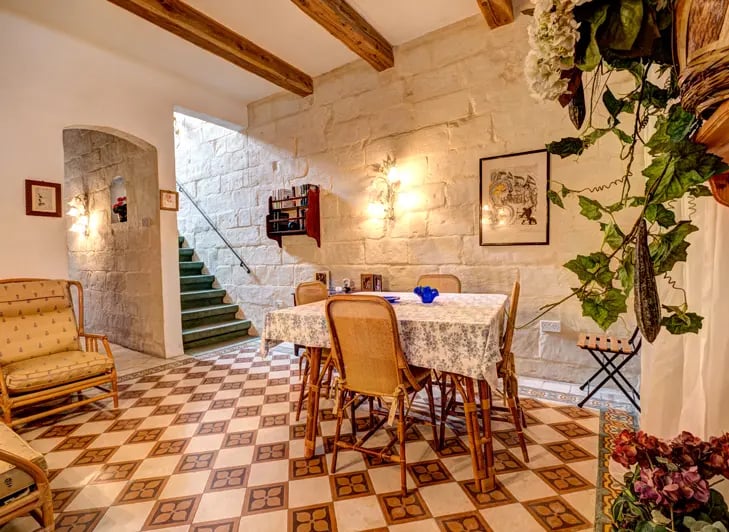Finding the right tenants without any problems
Many thousands of properties are rented out in Malta. These can range from apartments to penthouses, houses of character, farmhouses, villas, bungalows and more. In all cases a tenant will go through the same process of application, going through a screening process, land on a shortlist and if they have passed all the milestones, will be informed that they have qualified for renting the property. Whether you are an experienced renter or new to the market, your best bet is to appoint an experienced rental agent to help you through the entire process. A rental agent will source a selection of available properties in the areas you like, within your budget, complete all the documentation, assist you with the rental contract and ensure that everything is above board, legal and binding from start to end. This will save you an enormous amount of time and money too, as many properties that remain on websites are often not available any longer for rent! If you conduct the search for a rental property yourself, you won’t know that and it can be very frustrating.
Additionally, agents also have access to many properties that have not been advertised yet. Make use of a rental agent… you will never regret it as they will also assist you for the duration of your tenancy and act as a channel of communication between you and the landlord to solve any issues or questions you may have.
We address some of the most frequently asked questions and concerns posed by tenants, whether they are experienced or brand new to the rentals market. Here are the top 20 questions that tenants tend to ask when looking at renting a property in Malta:
1. I need to find a place to rent soon. What do I do first?
Most prospective tenants will first start out by looking on-line for a property to rent in the area of their choice and in the price range they can afford. Scouting for a property may also include speaking to family and friends or looking in the conventional press such as the daily newspapers. If you decide to find a place yourself, then make a shortlist of all the candidate properties that appeal to you and then contact the owner or responsible agent to start viewing the properties in person.
2. I’ve found the perfect place! What do I do next?
Once you have decided on a place of your liking after you have viewed it in person, it will be time to talk about the details. When it comes to submitting the required documentation, there will be quite a few things that will be needed such as your personal details, renting history, credit history, deposits and more. Once you have completed the entire process, you have to make sure that you get a copy of the signed rental contract, as this will protect both you and the landlord and ensure that both parties fulfil their responsibilities for the duration of the contract and even after your tenancy ends. Make sure you receive receipts for any monies paid, from start to finish.
3. Why do I need to submit any references?
A landlord cannot blindly accept anyone that applies to rent a property, as they need to be assured that you can come up with the rent, will look after the property, will not be any cause for concern during your tenancy and will return the property in a good or acceptable state when you leave one day. The only way the landlord can get concrete or factual proof of your past renting history is to ask for references.
4. What does this all involve?
The landlord will follow up on the leads that you provide and conduct interviews with your past landlord/s for starters. The prospective landlord will also check your debt-to-income ratio to see that you can afford the monthly rental amount, deposits and more. In addition to this the landlord can ask for a credit background check to verify your financial liquidity and this may also involve giving them your banking details. This is standard practice and nothing to be concerned about.

5. Do I need to show my identification document when I apply to rent a property?
Yes, proof of identification will always be needed so that the landlord can rest assured you are who you say you are. ID documents will take the form of a passport, residency ID card or possibly your driver’s license. To underscore your identity reference, the landlord may also ask for past utility bills in your name. Without any form of an up-to-date ID you unfortunately will not be considered as eligible.
6. What if there are “problems” with my references?
Don’t despair because it does not mean it is the end of the road. First-time school and home leavers usually do not have a past track record of credit, utility bills in their names or in some cases even a driver’s license. Many people have been in the same situation and have been able to rent a property. How is this done? By paying all the deposits and the entire rent amount in full for starters or getting someone to stand as guarantee for you. This person is known as the “guarantor”.
7. What is a guarantor and what will do they need to do?
A guarantor is someone that will stand in and guarantee that the rent, deposits, any arrears and damage amounts that may exceed any of the deposits will be paid. This often happens in the case when people have completed their studies and leave home for the first time, so here the guarantor will usually be a parent or guardian. This is only done when the process of referencing cannot be completed in full and for a guarantor to be considered as a legitimate “stand-in”, the landlord has to agree to it in writing.
8. Why is it expected from me to pay a deposit and is this acceptable?
It is the standard procedure world-wide to ask for a month’s rent as a deposit and in certain countries they may ask for several months’ worth of rent as a deposit. It is unlikely that you will find anyone who will rent to you without asking for a deposit. If you pay any amount of money out as a sign of goodwill to secure the property early on, ask for a receipt. This will count as part of your full deposit when things proceed.
9. What happens to the money that I pay as a deposit?
This amount is held (usually in an interest-bearing trust account) by the landlord as a guarantee against any damages that may need fixing or repairs that are needed to get the property back to its original state as you received it in – usually at the end of your tenancy. This deposit cannot ever be used by the landlord towards fixing what is considered “normal wear and tear”. If you looked after the property, you will most likely get back your full deposit.
10. What is the rental contract or agreement and do I have to sign it?
Yes, ALWAYS insist on a rental agreement or contract that will be recognised by the housing authority as legal, signed between you and the landlord. Within this contract will be contained all the rules and regulations pertaining to renting the property in question, personal information of you and the landlord, the rental amount per month and more. Getting and signing a rental agreement is for BOTH the protection of the tenant and the landlord. Always make sure you get a copy of the rental contract, as this will ensure your rights as a tenant, as recognised by law.
NEVER rent a property without signing and getting a copy of the contract. Your agent will be the best person to ensure you get a legal contract drawn up and signed, but if you do go it alone, we advise that you make use of the services of a reputable notary or even a lawyer. This is to ensure that the contract is drawn up within and according to the boundaries of the law, up-to-date with the latest rules and regulations and absolutely binding on both parties. Signing a one sentence paragraph on a shred of paper or a simple handshake these days will not protect your rights or monies paid out as a tenant

11. The contract mentions that inspections will be carried out from time to time. What is meant by this?
This means the landlord will from time to time come and inspect the property, looking for any maintenance issues and that the property is kept in a good state. This is the perfect opportunity to discuss any problems you may have with the property. It is the landlord’s responsibility to keep the property fit for occupation, with everything in good working order. Any damage or actions ascribed to negligence on your part means that you will have to pay for the repairs.
12. What is a snag list?
A snag list is a record of things in the property that you as the tenant will draw up in your first few days of occupancy. After completion, make a copy and give this to the landlord in order for him to fix.
13. What is the inventory?
This is a list of things that the property includes for use in the rent. This can be furniture, soft furnishings, art, crockery and cutlery, linen etc. All of these items will be checked against the inventory when you leave as to make sure nothing has been broken or is missing.
14. What happens if I or a family member or friend accidentally damages anything in or on the property?
Inform the landlord or the agent that represents you as soon as possible! Do not try and ignore or hide the damages, as it will be uncovered in the end and you will still end up paying for the repairs or replacement.
15. When can the landlord lawfully enter the property?
The landlord needs to notify you of any intentions to visit the property in advance, at a time that suits you. The only time the landlord can make an unscheduled visit is when there is an emergency. As a tenant you do not have the right to refuse reasonable scheduled visits by the landlord.
16. Am I allowed to hang pictures and make changes to the property?
You can only hang pictures on picture hooks or nails that are already there. For anything else you will have to get permission in writing from the landlord. You are not allowed to make any interior or structural changes to the property at all, install built-in cupboards, carpets, AC or the likes. If you want to do anything, get permission from the landlord and also establish whether you will be compensated at the end of your tenancy, as the landlord is not obliged to do so unless it has been stated so in writing.
17. What is considered as fair wear and tear?
This is the wear and tear of normal every items that is acceptable during your period of occupancy. This can be a doorknob that becomes wobbly, carpets that wear out in high-traffic areas, small scuffs and scratches on walls, surfaces and floors or for instance an oven or fridge door that had a questionable issue when you moved in and eventually fails due to daily use. Always make a list of anything that concerns you when you move in, take pictures and date the evidence and bring it to the agent or landlord’s attention in the very beginning. If you for instance purposely cause cracks in tiles, dents in appliances, rips in curtains or the likes, you will have to pay for replacing or repairing any of the affected items.
18. What happens if my landlord is in breach of the rental agreement conditions?
If you have a difficult and unreasonable landlord that neglects keeping the property in state that is deemed fit for occupation, talk to your agent or report the landlord to the authorities. There are strict policies in place to protect the rights of tenants. Always try your best to establish a line of communication between you and the landlord to resolve any issues and if this does not work after repeated attempts, take action. You have the right to do so.
19 .What happens in the case where I am unable to pay my rent?
Circumstances change and if you end up not being able to pay your rent, speak to the agent or the landlord as soon as possible and come to an agreement on how to schedule late payments. It is no use ignoring the issue as this will only make things worse. If you have been a good tenant, the landlord will most likely agree to find an amicable solution.
20. What happens at the end of my tenancy?
There could be several scenarios: you can enter into a new agreement if you want to continue living in the property, or the agreement can roll into a month-by-month agreement after the original period. If you want to end tenancy before the end of the original fixed term agreement, you will have to pay the rent for the total remainder period in full before you can move on. As always, speak to your agent or the landlord in order to find a solution first.
The last word: Why use Frank Salt Real Estate?
At Frank Salt Real Estate we have an experienced team of rental agents who have dealt with tenants and landlords for more than 50 years. We have extensive experience in how to find people the best rental properties, how to find landlords the best tenants and also how to manage occupancy effectively and pro-actively. We also offer property management solutions to landlords who are too busy to look after the day-today running of their rental properties, for a fee.




 Back to Blogs
Back to Blogs



